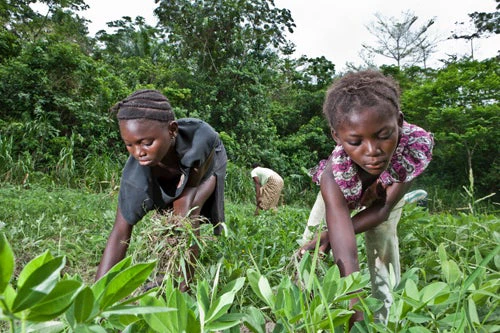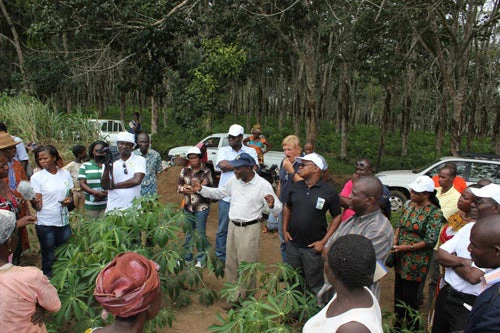
Most people are aware of Ebola's devastating impact on human health. To date, over 22,800 people have been infected and 9,000 have died. Its effects on West Africa's economy have also been well-documented. According to recent World Bank estimates, Ebola will cause at least US$ 1.6 billion in lost economic growth in Guinea, Liberia and Sierra Leone in 2015.
What do these numbers--and the pandemic-- mean for farmers, and the millions of people who rely on them for food?
With World Bank support through the West Africa Agricultural Productivity Program (WAAPP), country teams recently surveyed the agricultural landscape in Guinea, Liberia and Sierra Leone and what they found was alarming. Fears of infection are scaring farmers away from their fields. Quarantines and travel restrictions are also complicating efforts to organize farming teams, market produce, prepare fields for planting and maintain a steady supply of seed. Reports also show that hungry farming families have resorted to eating seed originally stored and intended for the next cropping cycle. All of this has set the stage for a labor shortage that has left many hectares of crops unharvested and thousands of families without food on their plates.

In Guinea, over 230,000 are hungry, and this number could rise to 470,000 by March 2015. In Liberia, nearly 65% of agricultural households worry that crop harvests will be smaller than last year. Sierra Leone’s most productive food producing area, Kailahun, is an epicenter for the epidemic.
Unless the world takes action to safeguard crop and livestock production, agriculture could break down in these 3 countries. This will not only cripple a vital driver of growth—in Sierra Leone alone, agriculture accounted for 50% of the economy in 2013. It could also jeopardize the livelihoods of countless smallholder farmers and leave up to 1 million people hungry.
What actions should be taken to avert hunger and revive the agriculture sector in Ebola-hit countries?
Find out what farmers need: How has Ebola affected farms and farmers? What challenges do they face every day and what do they need to get back on track? The Bank worked with teams that fanned out to different regions to conduct needs assessments. Hearing what the challenges and needs are straight from the source can help with the design and delivery of effective solutions.
Design effective emergency interventions: Field teams learned that what farmers needed most was seeds and fertilizers in time for the April planting season. Armed with this knowledge, country teams sourced seed suppliers, worked with partners to multiply foundation seed, and organize distribution of seeds and fertilizer in Guinea, Liberia and Sierra Leone. Travel routes for seed-laden trucks have also been pre-arranged with customs and border control, to ensure that trucks pass freely. The project aims to deliver 9,000 tons of certified seed and 1,500 tons of foundation seed to enable 200,000 farmers to plant maize and rice.
Make long-range plans to aid agricultural recovery: Farmers in Ebola-hit countries need to rebuild their farm assets. To support this process, the Bank Group has mobilized $15 million in emergency funding to finance the distribution of emergency seeds and building up the local capacity to produce certified seeds. But growing food and giving farmers a helping hand through better seeds, improved farming technology and more effective extension services are also needed. These activities are all supported through WAAPP.
Follow the World Bank Health team on Twitter: @WBG_Health
Related
New World Bank Group Push to Revive Agriculture, Avert Hunger for over One Million People at Risk in Ebola-hit Countries
Reviving Agriculture in Ebola-hit Guinea, Liberia and Sierra Leone


Join the Conversation